Table of Contents
If you own a Poodle, you may have noticed that they get anxious when left alone. Poodle Separation Anxiety is a common condition that affects many dogs, and it can be distressing for both the pet and the owner. This anxiety can manifest in different ways, including destructive behavior, excessive barking, and even physical symptoms like vomiting or diarrhea.
Understanding the causes and symptoms of Separation Anxiety in Poodles is crucial to managing the condition. While some dogs may be more prone to anxiety than others, it can also be a learned behavior. Fortunately, there are a variety of training and management techniques that can help alleviate Poodle Separation Anxiety. With patience, consistency, and a little bit of creativity, you can help your furry friend feel more comfortable and secure when you’re not around.
Key Takeaways
- Poodle Separation Anxiety is a common condition that can cause distress for both the pet and the owner.
- Understanding the causes and symptoms of Separation Anxiety in Poodles is crucial to managing the condition.
- With training, management, and patience, you can help your Poodle feel more comfortable and secure when you’re not around.
Understanding Poodle Separation Anxiety

If you are a poodle owner, you may have noticed that your furry friend can become anxious when you leave them alone. This is known as poodle separation anxiety, and it is a common problem among poodles. Separation anxiety is a condition that occurs when a dog becomes distressed, anxious, or depressed when separated from their owner or left alone.
Poodles are known for their intelligence and their ability to form strong bonds with their owners. However, this also means that they are more prone to separation anxiety than other breeds. Separation anxiety can manifest in different ways, including destructive behavior, excessive barking, and urinating or defecating in inappropriate places.
It is important to note that separation anxiety is not simply a case of your dog not liking being left alone. It is a serious condition that requires attention and treatment. If left untreated, it can lead to more serious behavioral problems and can even affect your dog’s health.
There are several factors that can contribute to poodle separation anxiety, including genetics, lack of socialization, and traumatic experiences. It is important to identify the cause of your poodle’s anxiety in order to find the appropriate treatment.
Treatment for poodle separation anxiety can include behavior modification, medication, and environmental changes. Behavior modification involves gradually exposing your dog to being alone and rewarding them for calm behavior. Medication can be used to help reduce anxiety in severe cases. Environmental changes such as providing your dog with toys and treats can also help reduce anxiety.
In conclusion, poodle separation anxiety is a common problem that can be treated with the right approach. If you suspect that your poodle is suffering from separation anxiety, it is important to seek help from a veterinarian or a professional dog trainer. With patience and the right treatment, your poodle can overcome their anxiety and live a happy, healthy life.
Signs and Symptoms

If you suspect that your Poodle is suffering from separation anxiety, it’s important to be aware of the signs and symptoms. Separation anxiety is a common problem among dogs, and Poodles are no exception. Here are some of the most common signs and symptoms of separation anxiety in Poodles:
Vocalization
One of the most common signs of separation anxiety in Poodles is excessive barking, whining, or howling. If your Poodle is barking or howling excessively when you’re not home, it could be a sign that they’re experiencing separation anxiety.
Destructive Behavior
Another common symptom of separation anxiety in Poodles is destructive behavior. This can include things like scratching at doors or windows, chewing on furniture or other objects, or digging at carpets or floors. If your Poodle is exhibiting destructive behavior when you’re not home, it’s possible that they’re experiencing separation anxiety.
Attempts to Escape
Poodles with separation anxiety may also try to escape from their home or crate. They may scratch at doors or windows, or try to jump over fences or gates. If your Poodle is attempting to escape when you’re not home, it’s possible that they’re experiencing separation anxiety.
Physical Symptoms
In addition to behavioral symptoms, Poodles with separation anxiety may also exhibit physical symptoms. These can include drooling, panting, shaking, or pacing. If your Poodle is exhibiting any of these physical symptoms when you’re not home, it could be a sign that they’re experiencing separation anxiety.
If you notice any of these signs or symptoms in your Poodle, it’s important to take action to address their separation anxiety. There are a variety of strategies and techniques that can be effective in helping dogs overcome separation anxiety, so it’s important to work with a qualified professional to determine the best approach for your Poodle.
Causes of Separation Anxiety in Poodles
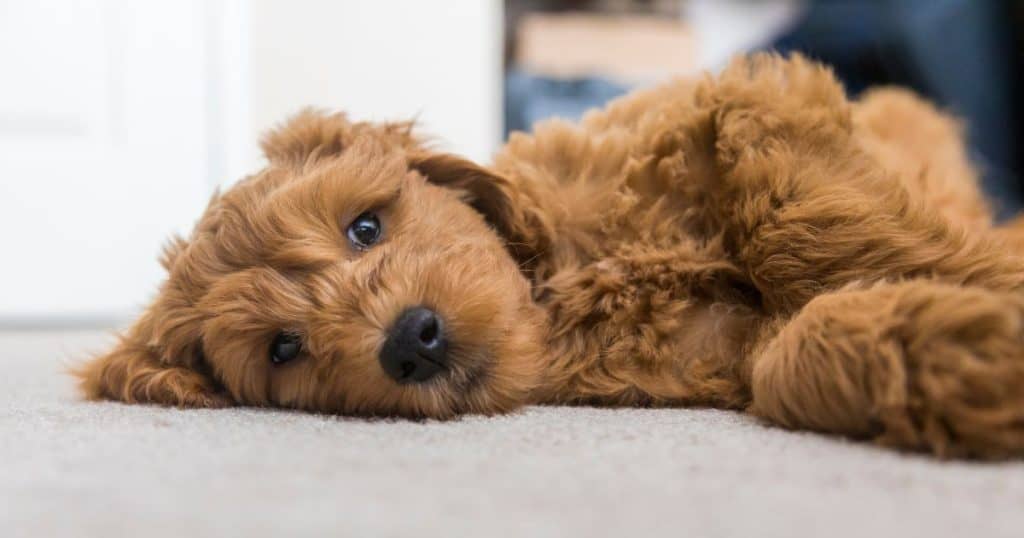
Separation anxiety in poodles can be caused by several factors, including neglect, genetics, aging, personality, and intelligence. Poodles are known to be highly intelligent and emotional dogs, making them prone to separation anxiety.
One of the primary causes of separation anxiety in poodles is neglect. If a poodle is left alone for extended periods, it can become anxious and stressed. This can lead to destructive behaviors such as excessive barking, chewing, and digging.
Another significant cause of separation anxiety in poodles is genetics. Just like humans, dogs can inherit certain traits and predispositions from their parents. If a poodle is prone to developing separation anxiety, it is likely that one or both of its parents also suffer from the disorder.
As poodles age, they can become more prone to separation anxiety. They may become more attached to their owners and feel more anxious when left alone. This can lead to destructive behaviors and increased stress levels.
Personality can also play a role in the development of separation anxiety in poodles. Poodles that are naturally anxious or timid may be more prone to separation anxiety. These dogs may become overly attached to their owners and feel anxious when left alone.
Finally, poodles’ high intelligence can also contribute to separation anxiety. These dogs are highly trainable and can quickly learn routines and behaviors. However, they can also become anxious and stressed if their routine is disrupted or if they are left alone for extended periods.
In conclusion, there are several causes of separation anxiety in poodles, including neglect, genetics, aging, personality, and intelligence. Owners should be aware of these factors and take steps to prevent separation anxiety in their pets. With proper training and care, poodles can learn to cope with being left alone and lead happy, healthy lives.
Poodle Separation Anxiety Triggers
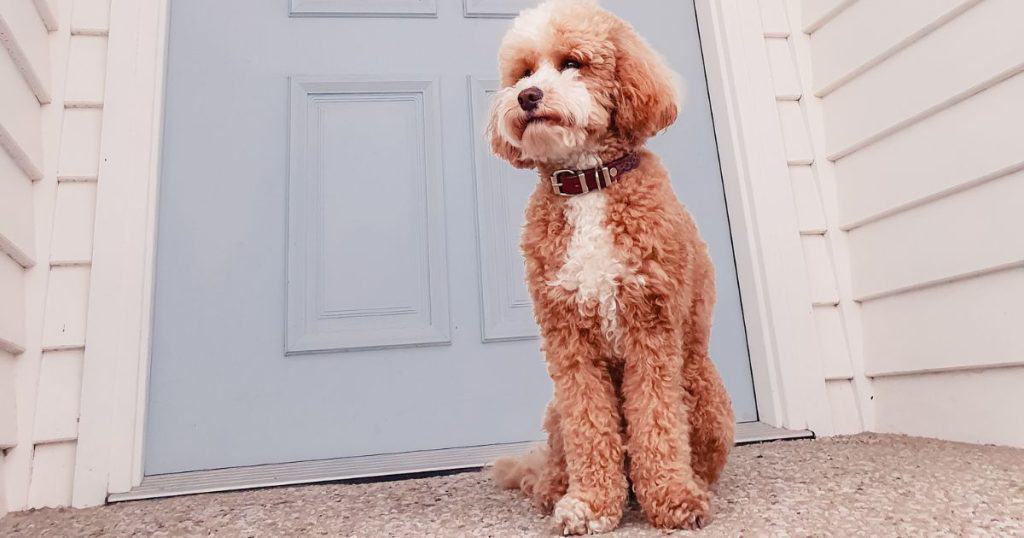
Poodle Separation Anxiety can be triggered by various factors, including being left alone, loud and sudden noises, and changes in routine. Poodles are social animals and can become anxious when their owners leave them alone for extended periods.
One of the most common triggers of Poodle Separation Anxiety is when owners leave the house. The mere sight of their owners picking up their keys or putting on their coat can cause anxiety in some Poodles. They may become restless, whine, bark, or even try to follow their owners out the door.
Another trigger of Poodle Separation Anxiety is loud and sudden noises such as thunderstorms, fireworks, or construction noise. Poodles have sensitive hearing, and these sounds can be overwhelming for them. They may become anxious, agitated, and even destructive when exposed to loud and sudden noises.
Changes in routine can also trigger Poodle Separation Anxiety. For example, if an owner who works from home suddenly starts going to the office, the Poodle may become anxious and stressed. Similarly, if there are changes in feeding or walking schedules, it can cause anxiety in some Poodles.
To minimize the triggers of Poodle Separation Anxiety, it’s essential to establish a consistent routine and gradually desensitize your Poodle to being alone. You can start by leaving your Poodle alone for short periods and gradually increase the duration over time.
Additionally, providing your Poodle with toys and treats can help distract them and make them feel more comfortable when left alone. Ensuring that they have access to water and a comfortable place to rest can also help ease their anxiety.
In summary, Poodle Separation Anxiety can be triggered by being left alone, loud and sudden noises, and changes in routine. By establishing a consistent routine, gradually desensitizing your Poodle to being alone, and providing them with toys and treats, you can help minimize their anxiety and ensure that they feel comfortable when left alone.
Separation Anxiety in Different Types of Poodles
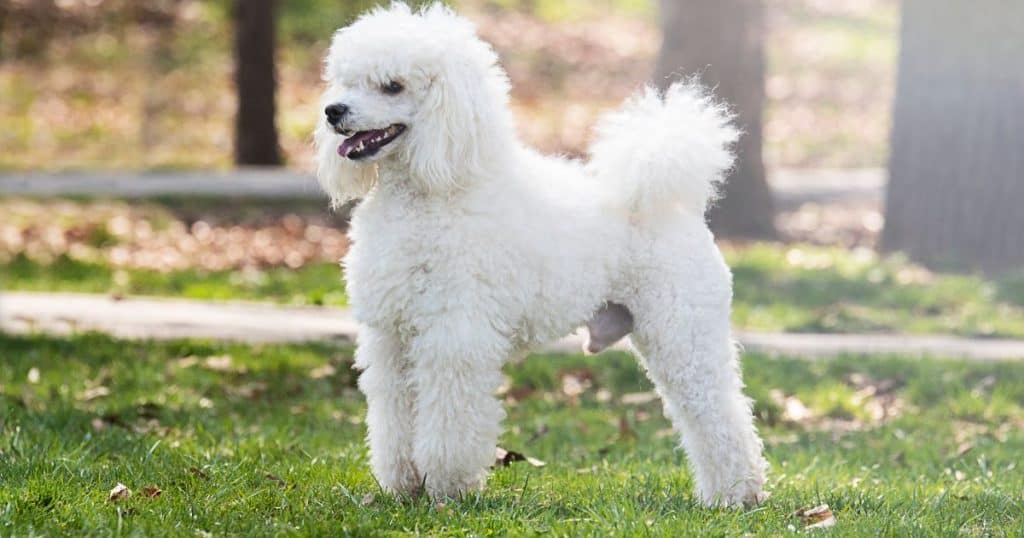
Separation anxiety is a common behavioral issue in dogs, including different types of Poodles such as the miniature, toy, and standard Poodle. While the severity of the condition can vary from dog to dog, it can cause a great deal of distress for both the Poodle and their owner.
Miniature and toy Poodles are known to be more prone to separation anxiety than their larger counterparts, the standard Poodle. This may be due to their smaller size and the fact that they are often kept indoors for longer periods of time. However, standard Poodles can also develop separation anxiety if they are not properly trained and socialized.
When left alone, Poodles with separation anxiety may exhibit a range of behaviors such as barking, whining, howling, destructive chewing, and even urinating or defecating in the house. These behaviors can be distressing for the owner and can also be dangerous for the Poodle.
To prevent separation anxiety in Poodles, it is important to provide them with plenty of exercise and mental stimulation. This can include daily walks, playtime, and training sessions. It is also important to gradually acclimate your Poodle to being alone for longer periods of time, starting with short intervals and gradually increasing the time.
Additionally, providing your Poodle with a safe and comfortable space, such as a crate or designated area, can help them feel more secure when left alone. It is also important to avoid making a big fuss when leaving or returning home, as this can reinforce your Poodle’s anxiety.
Overall, separation anxiety is a common issue in Poodles, but it can be managed with proper training, socialization, and care. If you are struggling with your Poodle’s separation anxiety, consult with a professional trainer or behaviorist for additional support and guidance.
Training and Managing Poodle Separation Anxiety
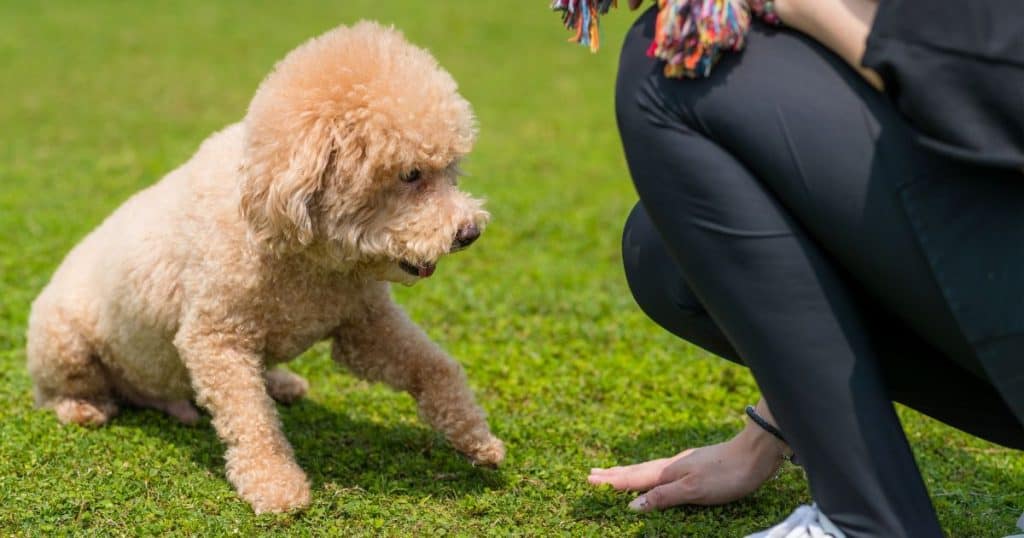
Dealing with Poodle Separation Anxiety can be challenging, but with the right training and management techniques, it can be overcome.
One of the most effective ways to train your Poodle is through positive reinforcement. This means rewarding good behavior with treats, praise, and attention. When your Poodle follows commands like “sit” and “stay,” reward them with treats and praise. This will help to build their confidence and reinforce their good behavior.
Crate training can also be an effective way to manage separation anxiety. Make sure the crate is a comfortable and safe space for your Poodle, and gradually introduce them to it by leaving them in it for short periods of time. Over time, increase the amount of time they spend in the crate until they are comfortable being in it for longer periods of time.
It’s important to remember that training takes time and patience. Don’t expect immediate results, and be consistent with your training techniques.
If you’re having difficulty training your Poodle, consider seeking the help of a professional dog trainer or behaviorist. They can provide you with personalized training techniques and help you manage your Poodle’s separation anxiety.
In addition to training, there are also treatments available for Poodle Separation Anxiety. These can include medication, supplements, and natural remedies. It’s important to consult with your veterinarian before starting any treatment to ensure it’s safe and effective for your Poodle.
Overall, managing Poodle Separation Anxiety requires patience, consistency, and a positive attitude. With the right training and management techniques, you can help your Poodle overcome their separation anxiety and lead a happy, healthy life.
Behavioral and Environmental Adjustments
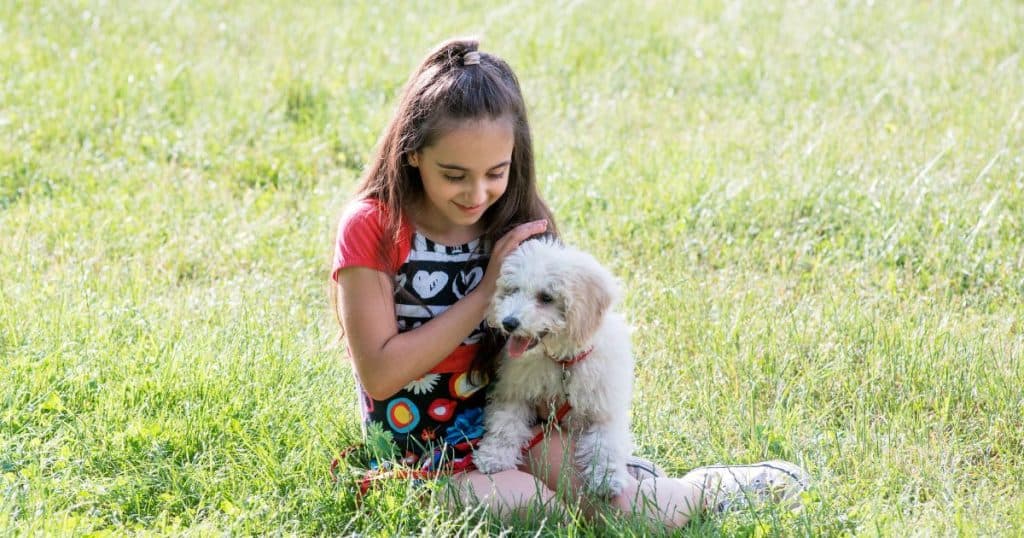
If your poodle is suffering from separation anxiety, there are a few behavioral and environmental adjustments that can help reduce their stress levels. One of the most important things you can do is to create a calm and comfortable environment for your poodle. This may include providing them with a comfortable bed, toys to play with, and access to fresh water.
Socialization is another important factor in reducing separation anxiety. Make sure your poodle is socialized from a young age, so they are comfortable around other people and animals. This can help them feel more secure when you are not around.
It’s also important to gradually increase your poodle’s independence. Start by leaving them alone for short periods of time and gradually increase the duration. This will help your poodle build confidence and reduce their anxiety.
Pacing is a common symptom of separation anxiety in dogs. If your poodle is pacing, try to distract them with toys or treats. You can also try leaving the radio or TV on to provide some background noise.
If your poodle is exhibiting destructive behavior when left alone, make sure they have plenty of toys to play with. You can also try leaving them with a puzzle toy or treat dispenser to keep them occupied.
Finally, companionship is key when it comes to reducing separation anxiety. If possible, consider getting a companion for your poodle. This can be another dog or even a cat. Having a companion can provide your poodle with the social interaction they need to feel secure when you are not around.
By making these behavioral and environmental adjustments, you can help reduce your poodle’s separation anxiety and create a more comfortable and secure environment for them.
Coping Mechanisms for Poodles
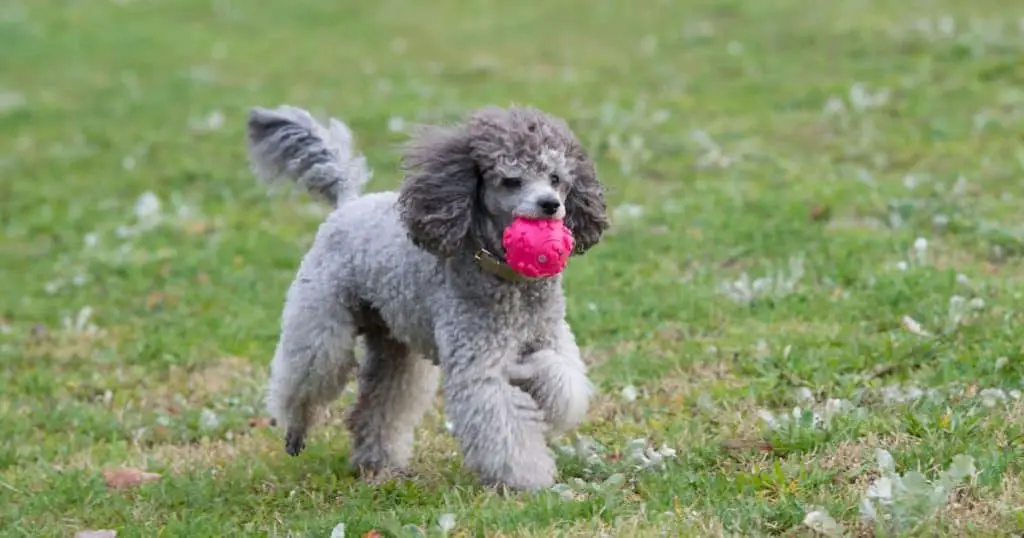
When it comes to dealing with separation anxiety in poodles, there are several coping mechanisms that can be used to help your furry friend feel more comfortable and at ease.
One of the most effective ways to help your poodle cope with separation anxiety is to provide them with plenty of comfort and reassurance. This can be done by leaving their favorite toys and blankets with them, as well as leaving a piece of clothing that smells like you in their crate or bed.
Another helpful coping mechanism is exercise. Regular exercise can help your poodle burn off excess energy and reduce their anxiety levels. Taking your poodle for a walk or run before you leave the house can help them feel more relaxed and calm.
Distraction is another useful coping mechanism. Providing your poodle with toys or puzzles to keep them occupied while you’re away can help to keep their mind off of your absence.
Counter-conditioning and desensitizing can also be effective ways to help your poodle cope with separation anxiety. This involves gradually exposing your poodle to the things that trigger their anxiety, such as your departure cues, and rewarding them for remaining calm.
There are also several products that can be used to help alleviate separation anxiety in poodles. Thundershirts, which provide gentle pressure to the body, can help to calm anxious dogs. L-tryptophan supplements can also be beneficial, as they help to increase serotonin levels in the brain, which can promote relaxation and reduce anxiety. Pheromone diffusers, such as Thunderease, can also be helpful in creating a calming environment for your poodle.
Overall, coping mechanisms for poodles with separation anxiety involve providing comfort, exercise, distraction, counter-conditioning, and using helpful products. By using these techniques, you can help your poodle feel more relaxed and comfortable when you’re away from home.
Role of Diet and Treats in Managing Anxiety
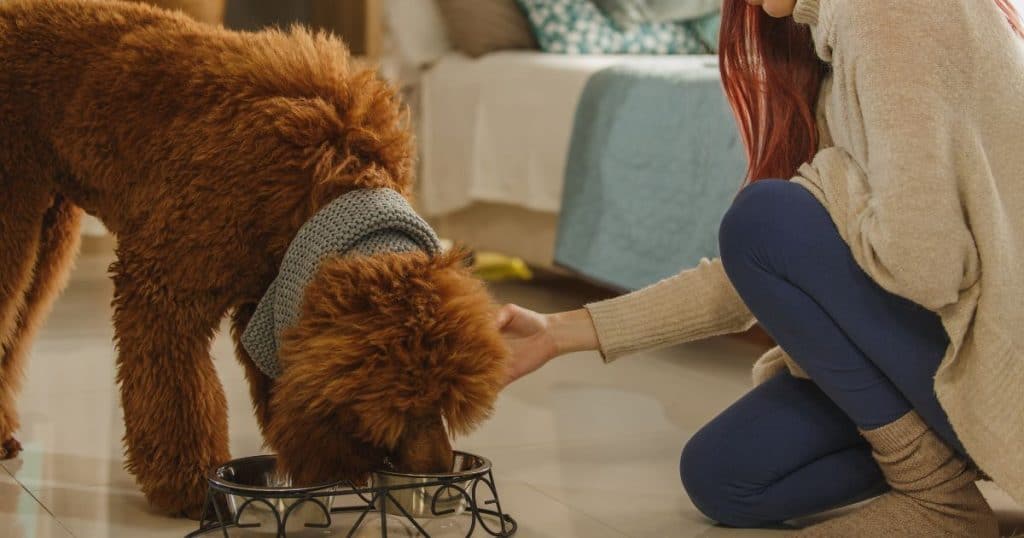
Diet and treats play a crucial role in managing poodle separation anxiety. Feeding your poodle a healthy and balanced diet can help to reduce anxiety symptoms. When selecting food for your poodle, opt for high-quality dog food that is free from artificial flavors and colors. A well-balanced diet can help to keep your poodle’s energy levels stable, which can help to reduce anxiety.
In addition to a healthy diet, giving your poodle treats can also help to manage separation anxiety. Treats can be used to create positive associations with being alone and can help to distract your poodle from their anxiety. When selecting treats, opt for high-value treats that your poodle loves. High-value treats can include things like small pieces of cooked chicken or cheese.
It’s important to note that treats should not be used as a substitute for training or behavior modification. While treats can be helpful in managing separation anxiety, they should be used in conjunction with other management techniques.
Creating positive associations with being alone is key to managing separation anxiety. One way to do this is to give your poodle a special treat or toy that they only get when they are alone. This can help to distract your poodle from their anxiety and create positive associations with being alone.
In summary, a healthy and balanced diet, along with high-value treats, can help to manage poodle separation anxiety. Treats can be used to create positive associations with being alone and can help to distract your poodle from their anxiety. However, it’s important to use treats in conjunction with other management techniques and not as a substitute for training or behavior modification.
Professional Help and Medication
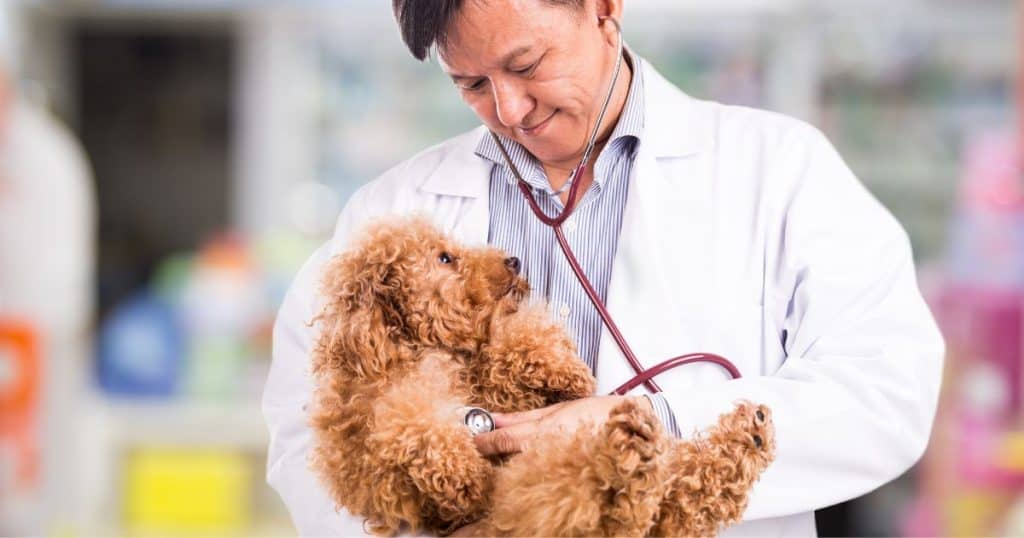
If your Poodle is experiencing severe separation anxiety, it may be time to seek professional help. A veterinarian or professional dog trainer can help you get a handle on this issue so your Poodle can enjoy time alone, rather than suffering from it.
The use of medication can be very helpful, especially for severe cases of separation anxiety. Some dogs are so distraught by any separation from their owners that treatment can’t be implemented without the help of medication. Anti-anxiety medication can help a dog tolerate some level of isolation without experiencing anxiety. However, medication should only be used under the guidance of a veterinarian, who can determine the appropriate dosage and monitor any side effects.
In addition to medication, professional dog trainers can help you develop a behavior modification plan to reduce your Poodle’s separation anxiety. They can teach you techniques to help your dog feel more comfortable when left alone, such as gradually increasing the time that your Poodle is alone and creating a calm and relaxing environment before you leave.
It’s important to remember that each dog is unique and may require different treatment plans. What works for one dog may not work for another, so it’s essential to work with a professional to develop a personalized plan for your Poodle. With patience and persistence, you can help your Poodle overcome separation anxiety and enjoy a happier, more relaxed life.
Preventing Separation Anxiety in Poodle Puppies
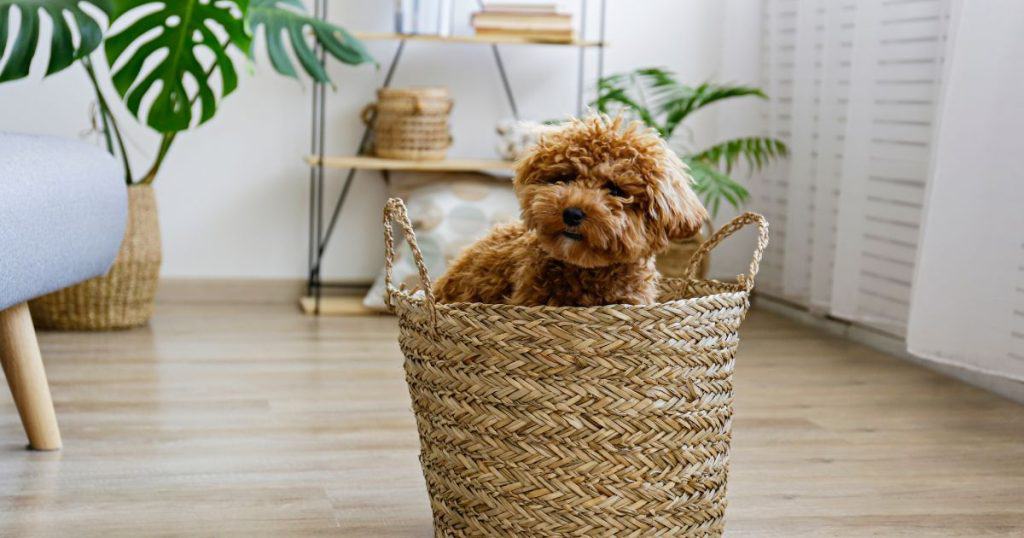
If you are a new poodle puppy owner, you may be wondering how to prevent separation anxiety in your furry friend. Separation anxiety is a common issue for poodles, but there are steps you can take to prevent it from developing.
One of the most important things you can do is to start training your poodle puppy from a young age. This includes crate training and getting your puppy used to being alone for short periods of time. Gradually increase the amount of time your puppy spends alone to help build their independence.
Another important step is to make sure your puppy gets plenty of exercise and mental stimulation. Poodles are intelligent dogs and need plenty of mental stimulation to keep their minds active and engaged. Provide your puppy with plenty of toys and puzzles to keep them entertained.
Desensitization is also an effective way to prevent separation anxiety in poodle puppies. This involves gradually exposing your puppy to situations that may cause anxiety, such as being left alone or hearing loud noises. Start with short periods of exposure and gradually increase the duration over time.
If you are struggling to prevent separation anxiety in your poodle puppy, consider seeking the help of a professional behaviorist. A behaviorist can provide you with personalized advice and training techniques to help prevent separation anxiety and other behavioral issues in your puppy.
By taking these steps, you can help prevent separation anxiety in your poodle puppy and ensure they grow up to be happy, healthy, and well-adjusted dogs.
Before You Go
In conclusion, separation anxiety is a common problem among poodles and can be distressing for both the dog and the owner. It is important to recognize the signs of separation anxiety and take steps to reduce the stress and anxiety that your poodle experiences when left alone.
Some of the strategies for managing poodle separation anxiety include gradual desensitization, providing a safe and comfortable environment, and using positive reinforcement training techniques. It is important to work with a qualified animal behaviorist or veterinarian to develop a treatment plan that is tailored to the specific needs of your poodle.
Remember that separation anxiety is a treatable condition, and with patience, consistency, and proper training, you can help your poodle feel more secure and comfortable when left alone. By taking proactive steps to manage your poodle’s separation anxiety, you can help ensure that your furry friend lives a happy, healthy, and stress-free life.
If you suspect that your poodle is suffering from separation anxiety, it is important to seek professional help as soon as possible. With the right treatment plan and support, you can help your poodle overcome their anxiety and live a happy and fulfilling life.
We hope that this article has been informative and helpful in understanding poodle separation anxiety. Remember to always prioritize your poodle’s mental health and well-being, and seek professional help if needed.
FAQs
How long can Poodles be left alone without experiencing separation anxiety?
The amount of time a Poodle can be left alone without experiencing separation anxiety varies depending on the individual dog. However, it is generally recommended that no dog be left alone for more than 8 hours at a time.
Are Poodles more prone to separation anxiety than other breeds?
Poodles are not more prone to separation anxiety than other breeds. However, separation anxiety can affect any dog breed.
Can leaving a Poodle alone for too long cause separation anxiety?
Leaving a Poodle alone for too long can contribute to the development of separation anxiety. Dogs are social animals and crave companionship, so it is important to provide them with adequate socialization and interaction.
What are some ways to help a Poodle cope with being alone?
Poodles, like many other dog breeds, can experience separation anxiety when left alone. To help your Poodle cope with being alone, you can try the following:
- Gradually increase the amount of time your Poodle spends alone.
- Provide your Poodle with a safe and comfortable space to stay in while you are away.
- Leave your Poodle with toys, puzzles, or treats to keep them occupied.
- Consider hiring a dog walker or pet sitter to provide your Poodle with company while you are away.
What are some signs that my Poodle is experiencing separation anxiety?
Some signs that your Poodle may be experiencing separation anxiety include:
- Excessive barking or howling when left alone.
- Destructive behavior, such as chewing or digging.
- Pacing or restlessness.
- Urinating or defecating in the house, even if they are house-trained.
What are some effective treatments for Poodle separation anxiety?
There are several effective treatments for Poodle separation anxiety, including:
- Gradual desensitization to being alone.
- Counter-conditioning to help your Poodle associate being alone with positive experiences.
- Medications prescribed by a veterinarian to help manage anxiety.
Remember that every dog is unique, and what works for one dog may not work for another. It is important to work with a veterinarian or animal behaviorist to develop a treatment plan that is tailored to your Poodle’s specific needs.
In conclusion, separation anxiety can be a challenging issue for Poodle owners to deal with, but there are many effective strategies for managing and treating this condition. By providing your Poodle with the right care, attention, and support, you can help them feel more comfortable and secure when you are away.


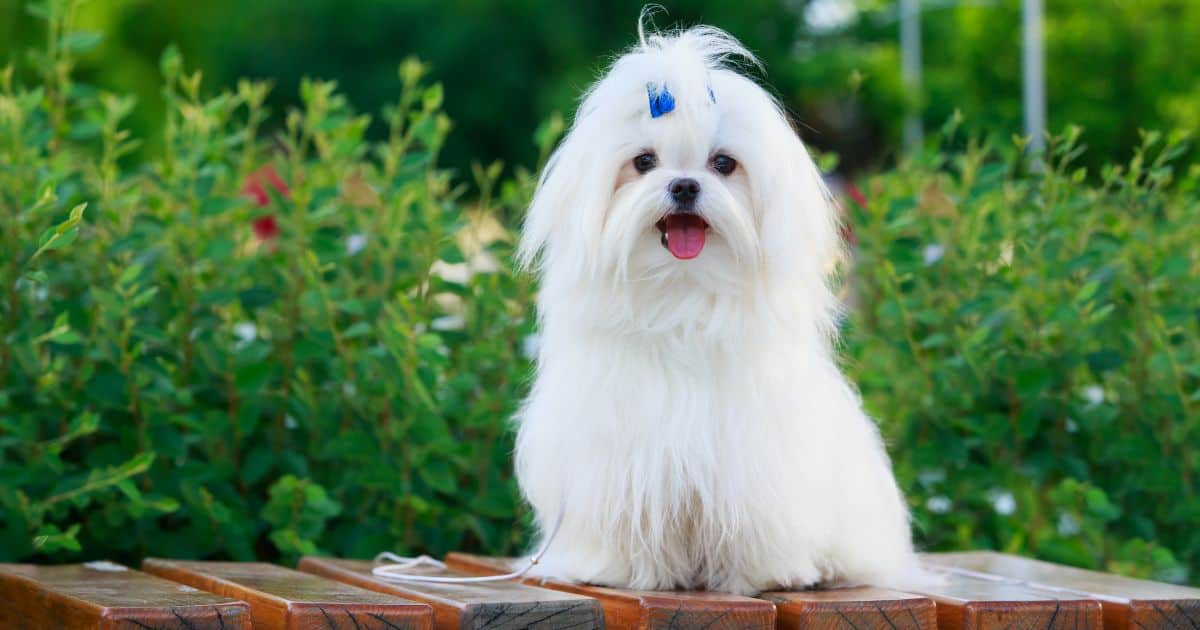
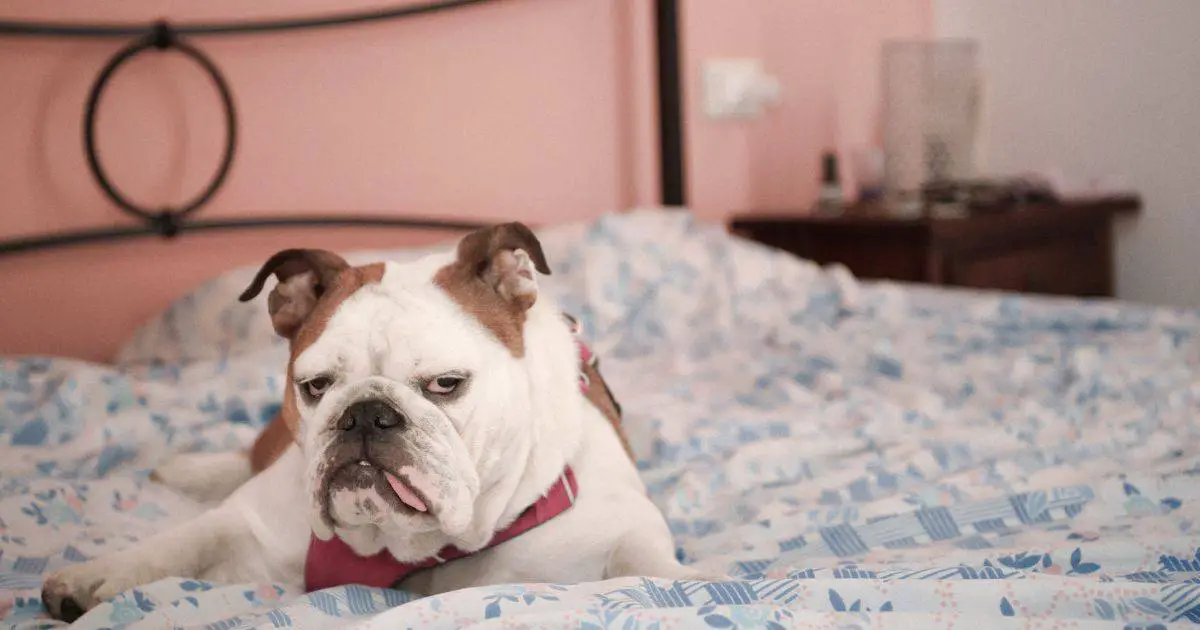
Leave a Reply
You must be logged in to post a comment.